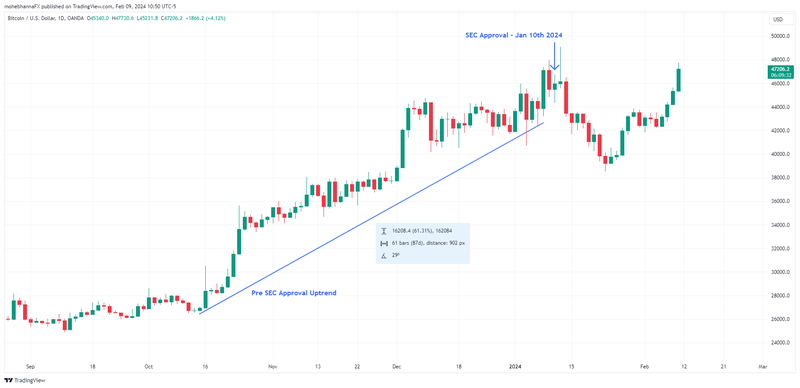How will bitcoin ETFs affect the crypto market in 2024?
A battle between cryptocurrency advocates and the U.S. Securities and Exchange Commission (SEC) has finally reached a conclusion with the regulator approving 11 spot ETF applications in January.
But what exactly does that mean for cryptos going forward, and is it as significant as many have suggested?
Adoption and acceptance
January marked a significant symbolic leap forward for bitcoin and, by extension, cryptocurrency markets that goes way beyond trading and access to new pools of investors.
It was a moment in which bitcoin took another meaningful step toward being taken seriously as a tradable financial instrument, regardless of whether you’re an advocate or a skeptic. Not everyone is bullish on the dollar, the S&P 500, or Apple, but people do have the ability to speculate on them easily and securely in a regulated environment.
An ETF offers traders a regulated way in which they trade bitcoin without needing to worry about crypto exchanges, wallets, security, or private and public keys.
Is a bitcoin ETF bullish for the price?
There are many who would like us to believe that’s the case, and they may be proven to be right. But there’s no guarantee. Just because more people can trade an instrument, it doesn’t mean they’re all bullish on the price.
The price will likely continue to be driven by a multitude of other factors; an ETF just offers another way to participate.
That said, for many, the approval of bitcoin ETFs removes barriers to entry, which should open the door to those who want exposure to the market, even if just as a small portion of their investing portfolio. And that alone makes this an important milestone.
What happened to the price in the run up to, and after theaftermath of the spot ETF approvals?
The price of bitcoin performed well in the three months leading up to the SEC approval, rising more than 60% in that time. It continued higher briefly after the decision before then falling more than 20%, in less than two weeks, highlighting just how volatile cryptocurrencies can be in a short period of time. The price then recovered the bulk of those losses, which has generated plenty of speculation around what the rest of the year may have in store.
What should bitcoin traders focus on next?
In the long-term, investors care more about bitcoin than just whether they can trade on itIn the long term, investors care about more than just whether they can trade bitcoin. They will increasingly demand to know what function it serves, where it sits in the financial ecosystem, and whether it can continue to justify such high prices or rise much further.
Until now, a crucial element that has driven the price of cryptos higher has been the excitement around what could be, hype, and the hope of exceptional returns. That can’t last forever.
Halving events, like the one expected to take place in April, are believed to boost the price of bitcoin over time, but it’s certainly not guaranteed. Just because we’ve seen that before, it took time for the price to rise, and what’s to say at that point that the halving was a driver of it? In bitcoin, as with other financial instruments, there are no guarantees.
But one thing that the halving event does generate is exposure, as it becomes a topic of discussion and widespread speculation. That in itself could generate enthusiasm and excitement, at which point it may become self-fulfilling. That said, as the industry matures and more sophisticated investors play a larger role, empty hype may start to be less impactful and volatility could subside.
What next?
In theory, the bitcoin spot ETFs are an important milestone in the journey toward widespread acceptance and adoption, but it isn’t everything. Investors always demand more, and it’s up to the crypto community to prove that bitcoin’s price reflects its longer-term value.
Already, speculation is brewing around what other ETFs could potentially follow after the success of spot bitcoin, which has opened the door to other applications. It’s an exciting time for the industry, but the future needs to offer more than just more ETFs if the community wants to keep investors on board. It needs to prove itself as more than just the speculative instrument that many still view it as.
Disclaimer
This article is for general information purposes only, not to be considered a recommendation or financial advice. Past performance is not indicative of future results.
It is not investment advice or a solution to buy or sell instruments. Opinions are the authors; not necessarily that of OANDA Corporation or any of its affiliates, subsidiaries, officers or directors. Leveraged trading in foreign currency contracts or other off-exchange products on margin carries a high level of risk and may not be suitable for everyone. We advise you to carefully consider whether trading is appropriate for you in light of your personal circumstances. You may lose more than you invest. We recommend that you seek independent financial advice and ensure you fully understand the risks involved before trading. Trading through an online platform carries additional risks. Losses can exceed deposits.
OANDA CORPORATION IS A MEMBER OF NFA AND IS SUBJECT TO NFA'S REGULATORY OVERSIGHT AND EXAMINATIONS. HOWEVER, YOU SHOULD BE AWARE THAT NFA DOES NOT HAVE REGULATORY OVERSIGHT AUTHORITY OVER UNDERLYING OR SPOT VIRTUAL CURRENCY PRODUCTS OR TRANSACTIONS OR VIRTUAL CURRENCY EXCHANGES, CUSTODIANS OR MARKETS.
Trading in digital assets, including cryptocurrencies, is especially risky and is only for individuals with a high risk tolerance and the financial ability to sustain losses. OANDA Corporation is not party to any transactions in digital assets and does not custody digital assets on your behalf. All digital asset transactions occur on the Paxos Trust Company exchange. Any positions in digital assets are custodied solely with Paxos and held in an account in your name outside of OANDA Corporation. Digital assets held with Paxos are not protected by SIPC. Paxos is not an NFA member and is not subject to the NFA’s regulatory oversight and examinations.


